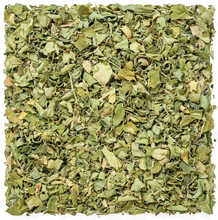What Is Moringa?
Moringa has gained a reputation for fighting inflammation and combating various effects of malnutrition and aging, earning the nickname “the miracle plant.”
Benefits of moringa include helping treat a wide variety of conditions, such as:
· Inflammation-related diseases
· Cancer
· Diabetes
· Anaemia
· Low energy and fatigue
· Arthritis and other joint pain, such as rheumatism
· Allergies and asthma
· Constipation, stomach pains and diarrhoea
· Epilepsy
· Stomach and intestinal ulcers or spasms
· Chronic headaches
· Heart problems, including high blood pressure
· Kidney stones
· Fluid retention
· Thyroid disorders
· Low sex drive
· Bacterial, fungal, viral and parasitic infections
Nutrition Facts
Moringa is a unique plant because almost all parts of it — leaves, seeds, flowers/pods, stem and roots — can be used as a source for nutrition and other medicinal properties.
The most popular medicinal use of this plant involves drying and grinding down moringa leaves, where most of the antioxidants are found. Studies have revealed that moringa powder is loaded with phytochemicals, protein, calcium, beta-carotene, vitamin C and potassium. Because it provides a concentrated source of vitamin A, it’s given to thousands of children in third-world countries every year suffering from life-threatening vitamin A deficiency, which is linked to impaired immune function.
Consuming it can also improve intake of trace minerals, amino acids and phenolic compounds. The plant contains a rare and unique combination of disease-preventing phytonutrients, including flavonoids, glucosides, glucosinolates, zeatin, quercetin, beta-sitosterol, caffeoylquinic acid and kaempferol.
Aside from the valuable leaves, the pods of the moringa tree also contain seeds that hold a healing type of oil. Oil from moringa seeds can be used to cook with or put directly onto the surface of the body.
According to Kuli Kuli, an organization that harvests moringa plants in Africa, gram for gram, the plant contains:
· Two times the amount of protein of yogurt.
· Four times the amount of vitamin A as carrots.
· Three times the amount of potassium as bananas.
· Four times the amount of calcium as cow’s’ milk.
· Seven times the amount of vitamin C as oranges.
Top 6 Moringa Benefits
1. Provides Antioxidants and Anti-Inflammatory Compounds
Moringa is high in several powerful anti-aging compounds that lower the effects of free radicals, oxidative stress and inflammation. These are associated with a reduced risk for chronic diseases, such as stomach, lung or colon cancer; diabetes; hypertension; and age-related eye disorders.
2. Balances Hormones and Slows the Effects of Aging
A 2014 study published in the Journal of Food Science and Technology tested the effects of moringa (sometimes also called “drumstick”) on levels of inflammation and oxidative stress in menopausal adult women. Researchers wanted to investigate if these superfoods could help slow the effects of aging by balancing hormones naturally. Results showed that supplementing with moringa caused significant increases in antioxidant status along with significant decreases in markers of oxidative stress. Better fasting blood glucose control and positive increases in haemoglobin were also found.
Can moringa help you sexually? There’s some evidence it may boost libido and work like a natural birth control compound.
Although it’s historically been used as a natural aphrodisiac, it actually seems to help reduce rates of conception. That said, it can boost the immune system during pregnancy and also increase breast milk production/lactation, according to some studies.
3. Helps Improve Digestive Health
Due to its anti-inflammatory properties, moringa has been used in ancient systems of medicine, such as Ayurveda, to prevent or treat stomach ulcers, liver disease, kidney damage, fungal or yeast infections (such as candida), digestive complaints, and infections.
A common use of moringa oil is helping to boost liver function, therefore detoxifying the body of harmful substances, such as heavy metal toxins. It might also be capable of helping fight kidney stones, urinary tract infections, constipation, fluid retention and diarrhoea and can aid weight loss.
4. Balances Blood Sugar Levels, Helping Fight Diabetes
Moringa contains a type of acid called chlorogenic acid, which has been shown to help control blood sugar levels and allow cells to take up or release glucose (sugar) as needed. This gives it natural antidiabetic and hormone-balancing properties.
Aside from chlorogenic acid, compounds called isothiocyanates that are present in moringa leaf have also been tied to natural protection against diabetes.
Can moringa help you lose weight? Because it can improve insulin sensitivity and hormone balance, it may offer some advantages to those following a weight loss plan.
5. Protects and Nourishes the Skin
Several popular uses of moringa oil are to help retain skin’s moisture, speed up wound healing, and soothe dry or burnt skin.
Moringa contains natural antibacterial, antifungal and antiviral compounds that protect the skin from various forms of infections. Some of the common ways it is used on the skin include reducing athlete’s foot, eliminating odours, reducing inflammation associated with acne breakouts, treating pockets of infection or abscesses, getting rid
of dandruff, fighting gum disease (gingivitis), and helping heal bites, burns, viral warts and wounds.
6. Helps Stabilize Your Mood and Protects Brain Health
As a high-protein food and a rich source of the amino acid tryptophan, moringa supports neurotransmitter functions, including those that produce the “feel good” hormone serotonin.
It’s also rich in antioxidants and compounds that may improve thyroid health, which makes it beneficial for maintaining high energy levels plus fighting fatigue, depression, low libido, moods swings and insomnia.




